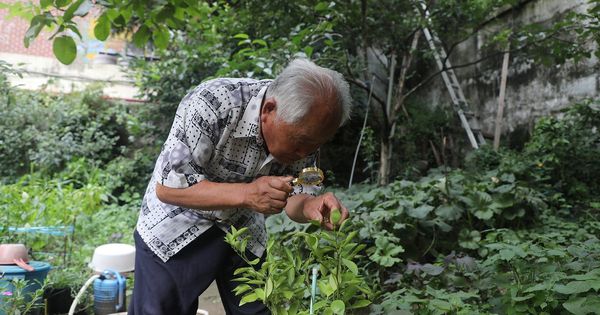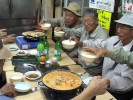Eye For Film >> Movies >> The 2nd Repatriation (2022) Film Review
The 2nd Repatriation
Reviewed by: Jennie Kermode

Every since the separation of North and South Korea, there have been people finding themselves on the wrong side of the border. Some are simply people who believe passionately in the ideology of the other side. Some stumble across it accidentally (obviously difficult to do by land, but possible by sea). Others cross it in order to spy. 63 of the latter have previously been returned to North Korea after serving prison sentences in the south, as detailed in Kim Dong-won’s 2003 film Repatriation. This documentary follows on from that one and traces the fate of other former spies who have been released from prison but are stuck in the south until the two nations can come to an agreement about getting them home.
It centres on what is known as the House of Gathering, an ordinary, albeit spacious home in Seoul whose courtyard has been converted into a vegetable garden. There, a number of former prisoners have settled so that at least they can be around others with similar backgrounds. They are subject to heavy surveillance, but most seem to live their lives like any other elderly people. Filming took place over many years and some were well into their nineties by the time it wrapped. Time does not ease the burden of homesickness; ageing is always disorientating, and much more so in a land which, to some of them, still feels alien.

Participating in the documentary is itself a strange experience, they say. In North Korea, cameras would be set up on tripods and filming would be carried out in an orderly manner. There is a lot of talk like this. In North Korea, life is easier, because one doesn’t have to look for a job – the government provides the job and all one has to do is work hard. In North Korea, fishermen accidentally straying from the south are greeted kindly and given provisions and sent home. This doesn’t tally well with established facts, but that doesn’t seem to matter. The idea that there has been famine in the North is either dismissed or blamed on ‘the American bastards,’ like many other things. Sympathy is expressed for people being killed by the American bastards in Iraq.
Much of this view of the world is built on propaganda, of course, but it’s complicated by the fact that they encounter plenty of obvious propaganda about capitalism. Several of them express horror at the gap between rich and poor, and at the ongoing destruction of the environment. Some, like disenfranchised people in the US, look to Donald Trump for hope, based on the fact that he succeeded in meeting with leaders of both North and South. Others still believe that reunification of the country is inevitable, and pour their energy into campaigning for it, whether by holding signs in the street or by shouting at random strangers on public transport.
Kim’s film is patiently, sensitively constructed, allowing plenty of room for his subjects to speak for themselves. Its driving emotional dynamic is the longing which many of them have to see families left behind, although some have formed new attachments in the South; one man who longs for repatriation so that he can see his child is dismayed by the fact that he’s legally required to divorce in order to achieve it. The director’s perspective is informed by the fact that is own mother was a refugee from the north, and towards the end of the film he addresses her deathbed revelation that he has another strong personal connection to that country, and its city of Kanggye, which gives him a new perspective on everything that has gone before.
A look at the little people caught up in the interplay of much greater forces, The Second Repatriation may be slow and meandering, but is full of fascinating moments. It depicts a microcosm of the sense of dislocation which many people feel in relation to world events, and emphasises how easily well-being slides off the agenda, no matter the system in which people live.
Reviewed on: 22 Nov 2022














